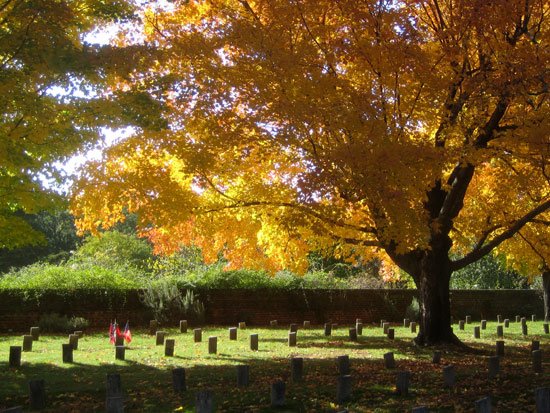 One hundred and forty years ago, on October 7, 1867, Henry Timrod died in Columbia, South Carolina. He was not yet 39 years old, living in abject poverty, and his death from tuberculosis was hastened by seldom having enough to eat in post-Sherman Columbia. Two years earlier, he had lost his home and business to Sherman's arsonists. Two of his sisters, and his own 10 month old son Willie, died in a single month—additional victims of Lincoln's War. Yet when Henry Timrod died, he was arguably the finest poet in America.
One hundred and forty years ago, on October 7, 1867, Henry Timrod died in Columbia, South Carolina. He was not yet 39 years old, living in abject poverty, and his death from tuberculosis was hastened by seldom having enough to eat in post-Sherman Columbia. Two years earlier, he had lost his home and business to Sherman's arsonists. Two of his sisters, and his own 10 month old son Willie, died in a single month—additional victims of Lincoln's War. Yet when Henry Timrod died, he was arguably the finest poet in America.
Born December 8, 1828 in Charleston, educated there and at the University of Georgia, Timrod spent a decade tutoring children of plantation families. He began writing verse as a teenager, his subjects usually nature or romance. The coming of Southern independence stirred him deeply. He became widely known in February 1861 with the publication of his poem "Ethnogenesis." Others, such as "The Cotton Boll," "Charleston," "Christmas," "Carolina," and "Spring" secured his fame as "laureate of the Confederacy."
This writer first encountered Timrod's "Ode" (in honor of the Confederate dead) when a high school student in the 1960s, in California. Studying American literature in college we read many of his other poems. Yet over the years, as the blight of political correctness settled across the land, Timrod was increasingly neglected and his work began to disappear from anthologies.
In late August of last year, singer-songwriter Bob Dylan released a CD of his newest work called "Modern Times," and it soon rose to number one on the charts. Within days, out in Albuquerque, New Mexico, a disc jockey named Scott Warmuth decided to do a Google search of Dylan's lyrics. What he found was astonishing. In one song, "When the Deal Goes Down," Dylan used poetic phrases from no fewer than four Timrod poems. Warmuth discovered many more examples of Dylan "borrowing" from the Southern poet. "I told my neighbor Chris about what I had turned up regarding Bob and Timrod," remembered Warmuth, "while our kids were riding bikes in the street between our houses one Sunday afternoon. It got his dander up, and he went and wrote the New York Times a letter ..."
Reporter Motoko Rich of the Times did some research, and her article appeared on September 14, 2006; asking tongue-in-cheek, "Who's This Guy Dylan Who's Borrowing Lines From Henry Timrod?" The word was out! Quickly other papers reprinted the story, or ran their own. From London to Atlanta; Sydney, Australia to Osaka, Japan—the story of the Timrod/Dylan connection appeared in at least 42 newspapers in 18 countries. It was discussed on-line on countless thousands of websites, blogs, and forums. National Public Radio's "All Things Considered" interviewed discoverer Scott Warmuth.
Some denounced Dylan's "plagiarism" while others defended his borrowings. Someone pointed out, for what it's worth, that the word Timrod can be spelled from the letters in "Modern Times."
Sales of Timrod's poetry spiked on Amazon. One on-line reviewer said, "After all the noise about Dylan's supposed borrowing from Timrod, I thought I'd give him a look. What one discovers is thoughtful and colorful poetry of a 19th century man ... [Except for] the Dylan furor, I never would have discovered him." He gave Timrod five stars.
The real story here, and cause for rejoicing? That Henry Timrod, neglected for so long, was discovered by legions of new readers. Truly, God works in mysterious ways, His wonders to perform!











































